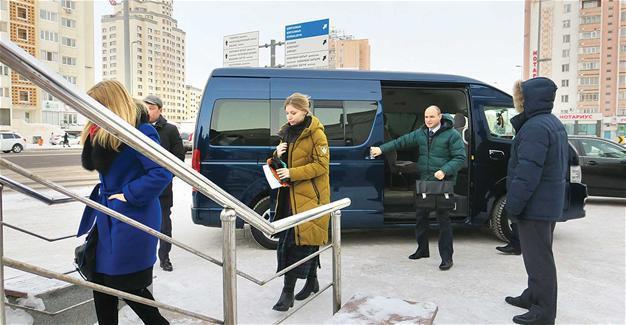Russia, Turkey, Iran discuss Syria cease-fire implementation in Astana
ASTANA
 Experts from Russia, Turkey, Iran and the United Nations held a technical meeting in Kazakhstan’s capital, Astana, to discuss in detail the implementation of the Syrian cease-fire agreement, Kazakhstan’s Foreign Ministry said Feb. 6.
Experts from Russia, Turkey, Iran and the United Nations held a technical meeting in Kazakhstan’s capital, Astana, to discuss in detail the implementation of the Syrian cease-fire agreement, Kazakhstan’s Foreign Ministry said Feb. 6.For the first time in the cease-fire talks to try to find a solution to the six-year-old Syrian war, representatives of Jordan also attended the meeting, Doğan News Agency reported.
The agenda of the meeting had been reviewing the implementation of the cessation of hostilities, discussing a proposal from the Syrian armed opposition about the cease-fire, and determining options about how to implement it, a spokesman from the Kazakh Foreign Ministry said, according to Reuters.
Fighting and air strikes have plagued the cease-fire agreement between the government and rebel groups since it took effect in late December, with the combatants accusing each other of violations.
“This is about creating a mechanism to control the implementation of the cease-fire,” the ministry spokesman said.
The opposing sides of the Syrian conflict, the Syrian regime and opposition forces, sat at the table for the first time in long years in Astana on Jan. 23-24, under the leadership of Turkey and Russia, in order to discuss a possible solution to the conflict.
The outcome was the establishment of a mechanism between Turkey, Russia and Iran for reviewing the implementation of the cease-fire.
After the talks, Russian negotiator, chief command official Stanislav Gadzhimagomedov, said the sides had also discussed preventing provocations and securing humanitarian access.
“The delegations have confirmed their readiness to continue interaction in order to achieve the full implementation of the cessation of hostilities in Syria,” Reuters quoted Gadzhimagomedovas saying.
Russia said on Feb. 5 that it supports the continuation of Syria peace talks under United Nations auspices, long-running negotiations which had been thrown into doubt by separate, Moscow-backed peace talks launched last month.
“We are not planning to replace Geneva with the Astana format,” he said in an interview published on the ministry’s web site on Feb. 5.
The latest round of U.N. talks had been planned to begin in Geneva on Feb. 8 but Russia’s Foreign Minister Sergei Lavrov said last week that they had been postponed.
Later, U.N. envoy for Syria Staffan de Mistura said he had decided to delay them to Feb. 20 to take advantage of negotiations between the Syrian government and opposition in Astana.
















